- Home
- Peter Grainger
An Accidental Death Page 3
An Accidental Death Read online
Page 3
‘Must be hard, though. A lot of memories, you and Sheila.’
There was a pause and Winters wondered whether he had spoken out of turn; the two men had not met for a couple of years, though before that there had been cases that brought them together. On a few occasions, the four of them, the two men and their wives, had gone out together.
‘Well, we get by. We go on, don’t we? How is Margaret?’
‘Yes, she’s good, DC.’
‘Give her my regards.’
‘I will – and she’ll send hers to you, I know.’
‘So what’s all this about Chelsea? A most unprofessional way to answer the telephone, I have to say.’
‘They’re shutting us down, DC, the bloody brass and suits between them are shutting us down. Reorganisation, rationalization, they can call it what they like – this unit shuts down in six months. After twenty five years. When I think about all the good blokes have risked their necks out of here… Still, I don’t need to tell you what it’s all about.’
But he did, and Smith listened, and asked questions and sympathized because he knew that nobody else would, nobody but a colleague who had been through something similar would understand the sense of frustration, the sense of betrayal. The county’s police diving team was rarely called out unless there was something horrible to be done but Winters had run it well; now ‘financial constraints’ would be given as a reason why he would have to break the news to two or three men, why the building would be sold off, why they would either transfer to a new combined unit in a neighbouring county or take up other duties. Winters had a couple of years to go to make his thirty; he would see it out but without commitment and without loyalty. Smith had seen it all before, and was seeing it increasingly now.
‘Anyway, DC, this wasn’t a social call, was it? What can I do for you?’
‘Bugger it if we can’t have a catch-up now and then. That’s half the trouble, isn’t it, people like you and me, we’re not efficient, are we? But you’re right, I have a motive for this call, for which I apologise.’
‘I’m guessing this is the lad we pulled out of the river near Upham Market?’
‘That’s it. Straightforward, was it? I saw your name in the log.’
‘Yes, me and Tim, last Sunday. I was doing a barbecue when they called us. Ask away.’
‘How long did it take to find him?’
‘Couple of hours. Longer than I’d expected - the river isn’t that big up there.’
‘Why did it take that long?’
‘There’s a channel down the centre, about eight feet deep. It’s where you normally find them before they blow up and float. We searched there first, up and down about half a mile.’
‘So where was he?’
‘In the edge, more or less, in a patch of lily pads and underneath some trees overhanging the water. It’s pretty overgrown in parts. Tim found him by just wading along the margin.’
‘No great depth then?’
‘Three feet I’d say. Maybe four.’
‘So had the current washed him into there?’
‘There isn’t much of a current, DC. It’s only a fenland drain, really.’
A pause. Winters could sense the other man’s mind at work, probing away at the new facts, trying to make sense of the location of the body; it was a little odd, now he came to think about it.
‘Thanks, Frosty, that’s definitely helped. Did you happen to notice how far he was from that field where he went in, where the kids were parked?’
‘Yes, we went in from the same place. About a hundred yards upstream. We must have gone past the body half a dozen times before we found him.’
‘A hundred yards… Is that all? Could he have drowned further upstream and then drifted down to where you found him?’
For the first time, Winters hesitated. Up to this point it had been about facts; now Smith was asking him to speculate.
‘Well, it’s like I said, DC. If you go and have a look, you’ll see what I mean. At this time of the year, the river hardly flows. I don’t see how what current there was could have pushed the body into where we found it.’
‘And you have it all on video, where it was before you pulled him out? Sorry, Frosty, I know I sound like I think you’re my grandma – I’m just thinking it through.’
‘Not a problem, DC. It’s all here plus copies of the stills. If you want, I can send you everything.’
‘I’ll let you know about that, I’ve seen enough video nasties to last me out, I think. Nothing else comes to mind, no signs of any disturbance on the bank, anything at all?’
‘Sorry, DC. As far as we were concerned, it was a find-the-body job. I just remember thinking it was a shame. But then, it usually is.’
‘Why did you think that?’
‘Well… He was a big, strong lad, well built. A bit of an athlete I should think. He took some lifting into the boat.’
‘I see. Frosty, you’ve been a great help. Don’t let the bastards grind you down. If you ever want to get that particular bastard called Devine in a dark alley one night, you let me know. Do they record all these calls now?’
‘Yes, I think so, DC.’
‘Good. Thanks a lot, Frosty.’
‘We should meet up, DC. Have a drink… Old times and that.’
‘Yes, we could do that.’
‘I’ll speak to Maggie, give you a call.’
‘Why not? Take care, Frosty.’
Waters was still finishing the phone calls that he had been asked to make. Smith busied himself at his desk, appearing not to listen but keeping one ear on the half of the conversation he could hear and mentally constructing the other. The boy was clear and confident on the phone, and seemed to have his wits about him; whoever he spoke to from the school obviously wanted to be told more than he should be, and Waters deflected that as well as some more experienced officers would have done. With the witnesses he was reassuring but firm. One of them, Smith couldn’t tell which yet, had other plans for this afternoon but by the end of the call had agreed to be collected at two o’clock.
‘Where are we picking them up from?’
‘Melanie Carter’s home.’
‘Both of them?’
‘Yes, sir.’
Smith waited with no expression until Waters remembered.
‘Oh, right. Sorry… But I don’t know what to call you. If we’re going to be working together, you’ll have to give me a clue.’
‘I’m not sure that we’re officially Starsky and Hutch, or ever going to be. This is, as I understand it, just an introduction that will show you how not to do anything.’
‘So what I just did I shouldn’t have done?’
‘Letting a rookie speak unsupervised to material witnesses on his first day? Probably not. But as regards this name business, you will have noticed people calling me ‘DC’, either because they wish it was my rank or because they are also my initials. I don’t mind which. The letters have also been perceived to stand for other combinations of insulting words over the years but we needn’t go into that. We’ll try ‘DC’ and see how it goes, right?’
‘OK, DC. Just one other question.’
‘Fire away.’
‘Who are Starsky and Hutch?’
‘Google it. Tell me about our dates for this afternoon.’
Waters read back from the notes he had made on the standard issue pad, filling in with comments of his own based on the conversations he had had with them. Melanie Carter was an able student, more mature than most; the deputy head had expressed surprise that she had been there at all. She had held positions of responsibility in the school and was expected to gain a good university place.
‘In what subject?’ asked Smith.
‘I don’t know – I didn’t ask. Is it important?’
‘No. Carry on.’
Steven Neale was also a capable student, would also go to university. He was something of a reformed character, having been a troublesome boy in his early years at St Martin’s.
Nevertheless, the deputy head would “Take his word in a serious matter such as this.”
‘Which one didn’t want to revisit the scene?’
‘How did…? Steven Neale, says he has a holiday job and won’t get paid.’
‘Very public-spirited. They both knew Wayne Fletcher well?’
‘For at least six years.’
‘Well done.’
Smith swivelled his chair away from the conversation. He would have preferred to pick up the two of them separately, perhaps even in different cars, but these days, what with mobiles and texts and Facebooks they’d have spoken to each other anyway – were probably discussing it right now. How long could he give this? Having Waters around for a couple of days might be a useful smokescreen, as it happened, but he would need something by the end of the day if he was not signing it off.
‘So what do you want me to do next, DC?’
‘This isn’t the prettiest business to be starting off with. You sure you’re alright with it?’
Yes, he was. Smith could see that if Waters was on a lead, he’d be pulling at it now, eager to get into the field – that always needed careful watching. Something to sober him up just a little, then.
‘Call back the chap I was just speaking to, Frosty Winters. He runs the police diving unit over at Hunston – they took the body out of the river. Send him my apologies, say Smith has gone senile and would like to see the video after all. Get him to attach it or whatever they do and send it here right away, to me. It’s all logged on. No doubt you could just hack your way in anyway…When it arrives, watch it, make notes of anything interesting. It won’t be very cheerful viewing, I can tell you. If DI Reeve asks what you’re doing, just say exactly what I told you to do.’
As he copied the number from Smith’s address book, Waters said, ‘Will do. What should I say if anyone asks where you are?’
‘Tell them I’ve gone to take a look at the real thing.’
Chapter Four
He stood on the paving slabs outside the police mortuary, debating whether to smoke the first of the three cigarettes that he allowed himself each day. Would it do him more good after seeing the body? It was a while since he had done this but at one time it had become almost a habit. On three occasions in his career he had needed to be present at the autopsy itself, something that seemed to happen often on the television but which was a rarity in most detectives’ working lives. Of course, he might not actually need to see it at all.
Olive Markham looked up as he opened the door into the anteroom. She had hardly changed since he had last seen her, the long, oval face and horn-rimmed glasses just as he remembered them, and he wanted to make some joke about embalming fluid, not that any such thing had ever been used here. As he approached and took her hand, he read the identity badge and complimented her on the promotion to Senior Mortuary Technician.
‘I am still the only one, Mr Smith. I had an assistant all-too-briefly but he is no longer with us.’
‘Oh dear. I hope he moved on rather than passed on. That would be taking one’s work too seriously, wouldn’t it?’
‘Darren was a victim of the thousand cuts, as we will all ultimately be. One can only wonder at the secret of your own longevity in these inauspicious times.’
‘Ah, well. I expect it’s something to do with what someone has already said this morning. I know where the bodies are buried.’
‘Mmm… Most amusing.’
She was labelling sample bags but fortunately they were empty. He waited until she chose to finish or interrupt the job; this was very much her domain and he was in no hurry to get on the wrong side of her.
As she folded the final bag, she said, ‘Someone once said that life is a meditation on death. I hope you kept up your practice.’
‘I did, do, more or less. Not every day, but most of them.’
She smiled briefly, and he saw just a raising of the eyebrows.
‘And what can I do for you today? We are open for business.’
He showed her the report in the file that he had brought with him, just to be sure there had been no mistake. Yes, she said, she had added the note; would he like to see copies of the photographs that she had taken? They were digital, of course, and as she loaded them onto the screen, he looked around at the quiet, clean and immaculately tidy room; it was hard to believe what tragedies and horrors had, in their time, lain out on tables beyond the double doors behind him.
The first image was on the screen – the upper torso and head, rather lurid in the camera’s flash, but the eyes closed as if in sleep rather than death. The features, when he looked more closely, had the slightly misshapen or bloated appearance that he recalled seeing on other victims of drowning. Olive said nothing, pointed at nothing, the cursor hovering over the arrow that would take them to the next picture when he was ready. On the right side of the head, on the curve of the temple, Smith could see the oval bruise, some four inches long and two inches wide.
He nodded and was then looking at a larger image, just the boy’s head now, and the bruise at the centre like a dark cloud on a pale, clay-coloured sky. Difficult to guess his age now, with the life washed out of him – he could be thirty, even thirty seven, twenty years older than he actually was when he died. Smith peered at the screen, remembering the note on the autopsy report. The bruise had different colours – red into purple, violet into green – but nothing that he could see was suspicious, nothing… He didn’t want to think it, let alone say it… Nothing fishy.
Without being told, and probably guessing at his thoughts, Olive Markham clicked on the arrow again. Now the bruise filled the screen. With the end of a silver fountain pen, she slowly traced an invisible line through the bruise, two then three times – and suddenly it was no longer invisible to him. Smith could see the shape of the fish, the simple Christian symbol one sees as a sticker on cars; the pointed oval body, the triangular tail. It wasn’t obvious or sharply defined but it was there. It wasn’t just a line, when you studied it – the whole fish was a little darker and more solid than the rest of the bruise – a bruise within a bruise.
Smith said, ‘What do you make of that?’
‘I’m not a believer, Mr Smith. I don’t think this is a sign from above. I just think it’s odd. I just thought that it shouldn’t pass without – comment.’
‘You pointed it out to Dr Robinson. What did he say?’
‘An odd little coincidence exploited by our over-active imaginations. I wouldn’t have said that I had one of those.’
Smith looked closely at the screen again. It was easy enough not to see it but, on the other hand, once you had seen it, it wouldn’t quite disappear completely. It could, conceivably, have been made by some knot or protuberance on a branch or some other underwater obstruction. And being where it was, and in the medium it was, the edges were not sharply defined – there was an inevitable vagueness to it, as if it were an old tattoo diffusing itself into the surrounding skin. But the boy was only seventeen.
‘He doesn’t have any tattoos or anything anywhere else, does he?’
‘No.’
Olive was a scientist as far as Smith was concerned, at least as capable as Robinson himself of giving clear answers to puzzled policemen, but he caught a note, just the tiniest note of uncertainty in that single syllable, and looked up at her from the screen.
‘Is there something else?’
‘Not in these photographs.’
‘Oh.’
He guessed what was coming next – perhaps today should have been a four-cigarette day after all.
‘This body came to us more quickly than most, and the fact that he drowned affects the rate of certain processes. Obviously, I’m in no position to speculate, but you know that things continue to change even after death, even in the cabinets.’
Smith nodded, waiting for her to unzip the bag. He didn’t think anyone ever really got used to this, except perhaps those who worked here for eight or ten hours a day – and even they must have adapted in
some way, it must change them, though he didn’t want to think about how. The old zips used to make a noise – this one was silent.
Olive Markham did not take the zip all the way down but Smith was reminded immediately of Frosty’s words; though Wayne Fletcher hadn’t been tall, not six feet anyway, he had been broad and muscular in the arms and chest, well built for a boy of his age. It was always worse when they were young. One of the girls had only been sixteen… Juliet Richardson. You looked at them, you couldn’t help it, and thought, that womb will never give birth, those breasts will never feed a child. Wayne no doubt thought he was the man – even in death the face had that truculent look about it – but he’d done nothing, had hardly lived, knew little of life’s real delights and disasters, except this final, untimely catastrophe.
The Senior Mortuary Technician was waiting for him to adjust and get back into role. He looked at her and shrugged, admitting that he could not see what she had seen.
‘It isn’t much. This bruising has appeared since the autopsy – but I don’t think it was caused by it.’
She pointed to the lower chest, to the side of the sternum. The incision had been neatly stitched up – Olive’s work – but on both sides of it he could see faint discolouration, just a few square inches of it. He leaned in to take a closer look and caught the smell of the body and the surgical processes that it had undergone – an odd combination of the operating room and a butcher’s shop. He drew back.
‘I see. Not much to go on, is it?’
Now it was her moment to shrug and say nothing. A part of Smith, the lazy, let’s have an easy life for a change part, wanted to leave this, sign the papers, dead-bat the brief, quizzical look from DI Reeve and go for a cup of tea with Budgie’s mum. He could take that decision now, and not ask Olive the question; no-one would ever be any the wiser.
‘Any thoughts? Off the record, obviously.’
‘The only time we see bruising there, under normal circumstances, is when someone has attempted CPR, and then only if they’ve been a little over-enthusiastic. Or if it’s done by someone that doesn’t know their own strength.’

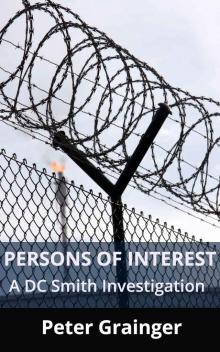 Persons of Interest
Persons of Interest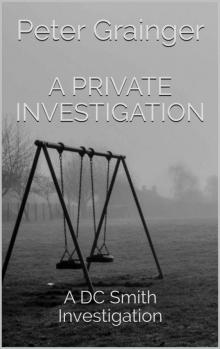 A Private Investigation
A Private Investigation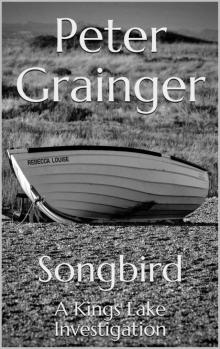 Songbird
Songbird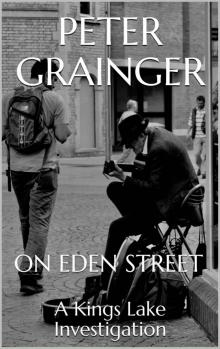 On Eden Street
On Eden Street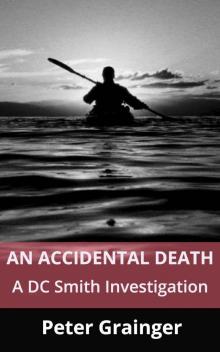 An Accidental Death
An Accidental Death Time and Tide
Time and Tide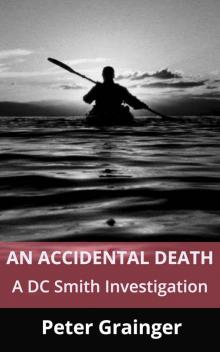 An Accidental Death: A DC Smith Investigation
An Accidental Death: A DC Smith Investigation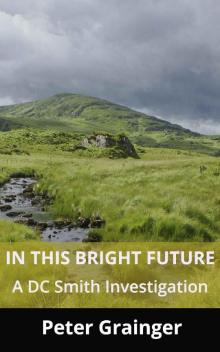 In This Bright Future
In This Bright Future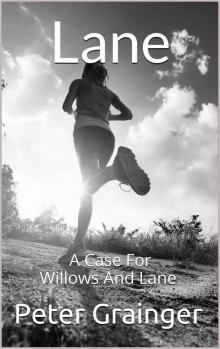 Lane: A Case For Willows And Lane
Lane: A Case For Willows And Lane The Rags of Time: A DC Smith Investigation
The Rags of Time: A DC Smith Investigation Luck and Judgement
Luck and Judgement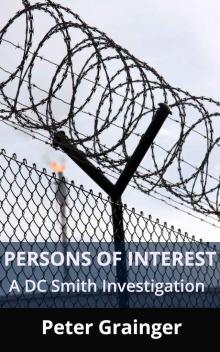 Persons of Interest: A DC Smith Investigation
Persons of Interest: A DC Smith Investigation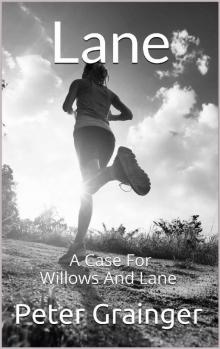 Lane
Lane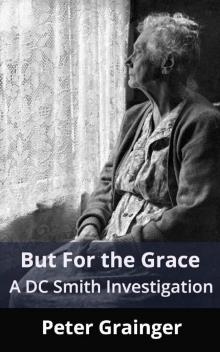 But For The Grace
But For The Grace Time and Tide: A DC Smith Investigation
Time and Tide: A DC Smith Investigation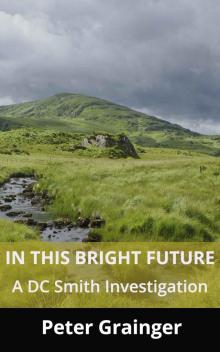 In This Bright Future: A DC Smith Investigation
In This Bright Future: A DC Smith Investigation The Rags of Time
The Rags of Time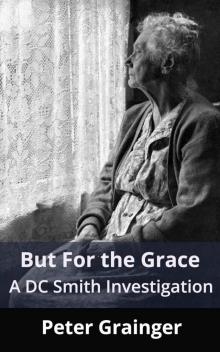 But For The Grace: A DC Smith Investigation
But For The Grace: A DC Smith Investigation Luck and Judgement: A DC Smith Investigation
Luck and Judgement: A DC Smith Investigation